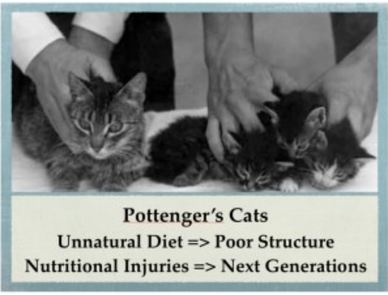
This will be the last post in the Epigenetics series. I hope that you learnt something interesting about epigenetics: the environment changing our genes.
Here is a really good example of epigenetics at work:
In the 1900s, Dr. Weston Price did an extensive study on the effect of diet on dentition and health. He studied native people of different countries and noticed their excellent health and perfect dentition, and tied it to the kinds of food they ate. These people ate traditional whole foods that were not refined/processed and, as a result, they were extremely healthy even into their old age.
In the following generations of these people, as they were exposed to more and more Western diets (when the Westerners would introduced their foods to these people eg, at the trading posts, etc), they developed tooth decay, had detrimental arch changes (malocclusion, narrowed dental arches, crowded teeth) and became unhealthy with many Western diseases such as diabetes and high blood pressure. {Weston A. Price, DDS, Nutritional and Physical Degeneration, 8th ed. (2008)}
Here is a really good example of epigenetics at work:
In the 1900s, Dr. Weston Price did an extensive study on the effect of diet on dentition and health. He studied native people of different countries and noticed their excellent health and perfect dentition, and tied it to the kinds of food they ate. These people ate traditional whole foods that were not refined/processed and, as a result, they were extremely healthy even into their old age.
In the following generations of these people, as they were exposed to more and more Western diets (when the Westerners would introduced their foods to these people eg, at the trading posts, etc), they developed tooth decay, had detrimental arch changes (malocclusion, narrowed dental arches, crowded teeth) and became unhealthy with many Western diseases such as diabetes and high blood pressure. {Weston A. Price, DDS, Nutritional and Physical Degeneration, 8th ed. (2008)}

Here is a very interesting video to watch: https://www.youtube.com/watch?v=XPCOGSnjP5w
At around the same time, Dr. Pottenger did a ten-year-long study on cats and found that the cats which were feed traditional, raw, unrefined meat and milk, as opposed to cats which were fed cooked meat and pasteurised milk, were extremely healthy and strong, with excellent skeletal and dental formation, maintained their fertility, and did not have any diseases. The cooked meat cats had poor health, compromised fertility, rampant tooth decay and even emotional challenges. The first group of cats had healthy offspring even into the third generation. In the cooked meat group, Dr. Pottenger was unable to get the cats past the third generation as the cats became sterile.
Both Dr.Price’s and Dr. Pottenger’s studies reinforced that the traditional, non-processed diet was by far more beneficial to health and dentition, both in the immediate generation, as well as for generations to follow.
(Pottenger, Jr., Francis M. Pottenger’s Cats: A Study in Nutrition. The Price-Pottenger Nutrition Foundation: 1983.)
We need to learn from these studies and apply it to our lives. It is, of course, convenient to eat processed and refined foods. A diet that is 50% refined and 50% traditional is still acceptable, though not the best, but if we bow to the convenience of a processed diet, then we are compromising our health and the health of future generations.
For more information, please visit http://ppnf.org/
At around the same time, Dr. Pottenger did a ten-year-long study on cats and found that the cats which were feed traditional, raw, unrefined meat and milk, as opposed to cats which were fed cooked meat and pasteurised milk, were extremely healthy and strong, with excellent skeletal and dental formation, maintained their fertility, and did not have any diseases. The cooked meat cats had poor health, compromised fertility, rampant tooth decay and even emotional challenges. The first group of cats had healthy offspring even into the third generation. In the cooked meat group, Dr. Pottenger was unable to get the cats past the third generation as the cats became sterile.
Both Dr.Price’s and Dr. Pottenger’s studies reinforced that the traditional, non-processed diet was by far more beneficial to health and dentition, both in the immediate generation, as well as for generations to follow.
(Pottenger, Jr., Francis M. Pottenger’s Cats: A Study in Nutrition. The Price-Pottenger Nutrition Foundation: 1983.)
We need to learn from these studies and apply it to our lives. It is, of course, convenient to eat processed and refined foods. A diet that is 50% refined and 50% traditional is still acceptable, though not the best, but if we bow to the convenience of a processed diet, then we are compromising our health and the health of future generations.
For more information, please visit http://ppnf.org/


 RSS Feed
RSS Feed